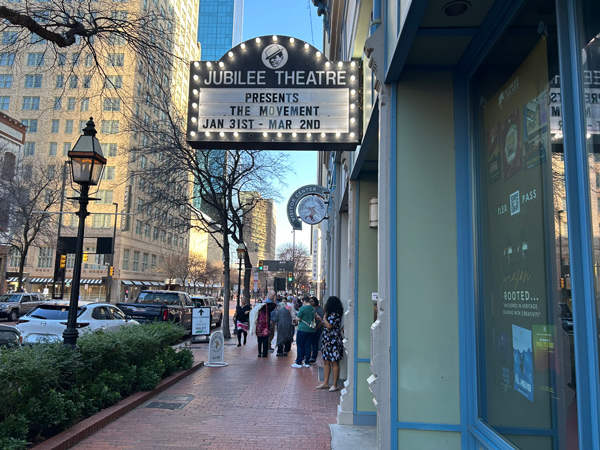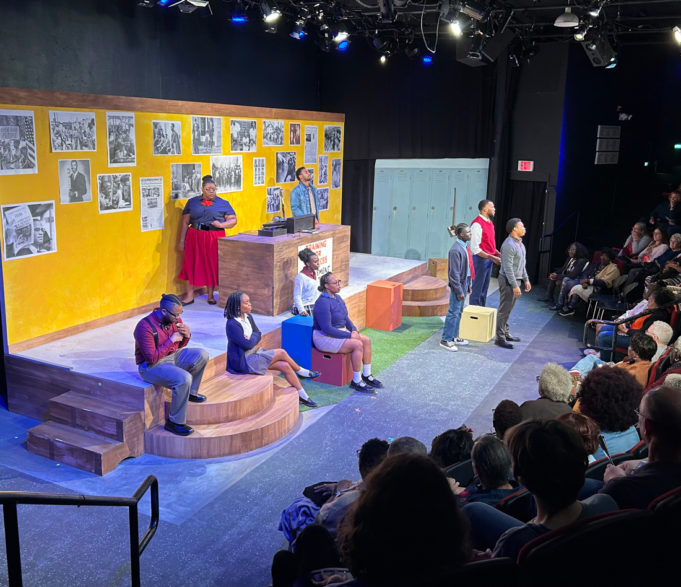On your first visit to Jubilee Theatre, which showcases stories about the African American experience, you are considered a good friend. A second trip downtown elevates you to companion status, and by the third visit, you are deemed part of the family.
That’s what audience members were told on a recent Saturday afternoon performance of The Movement, an a cappella musical that shines light on the group of Black teenagers who protested in Alabama during the Civil Rights movement. While catching up with D. Wambui Richardson, Jubilee’s artistic director, he defined this family as “a place where you are heard, where you are seen, where you are loved, where it is OK for us to disagree with one another, but it’s how we choose to disagree with one another.”
Jubilee Theatre is about halfway through its 44th season, which centers on roots and heritage — a fitting theme for a theater founded on Juneteenth of 1981. Created by Rudy and Marian Eastman in Fort Worth, Jubilee boasts the title of “original home of African American theater in North Texas.” Jubilee had its first season at 1801 E. Vickery Blvd., then became a nomadic theater as its players performed in multiple venues. In 1987, Jubilee moved into a dedicated space across from Texas Wesleyan University, then, by the ’90s, Jubilee’s board raised enough money to take over a space in Sundance Square, 506 Main St., where Jubilee resides today. From then on, the theater saw a period of growth in audience attendance, production values, budget, and accolades.
For Board President Anita Heiskell, Jubilee’s biggest accomplishment is its existence as “one of the only African American theaters in this area, having a place where people know where we are, and being able to produce and direct some amazing productions for people to come out and see.”
Richardson, who has 30 years of experience in the arts and has served at multiple institutions throughout the country, joined the team at Jubilee in 2018. He’s the one who picks the productions each season, and he prioritizes creating a space where artists can grow their talents. Though Jubilee is dedicated to telling stories that illuminate the African American experience, Richardson said he looks for productions that unify all kinds of people.
Jubilee Managing Director Janaé Willis-Beard said, “We are a Black theater, but Black history is American history, and our stories are American stories. Our stories are for everyone.”
Not long after Richardson started at Jubilee, the pandemic hit and created a hardship for live theater across the country and world. While Jubilee did survive, and Heiskell even said the theater fared well during this time, getting people to attend in-person shows like they used to has been difficult. Richardson said before COVID, Jubilee could fill 93-95% of the theater for musicals and 80-85% for non-musicals. Attendance now is considerably less, and Richardson said he’s heard his contemporaries say, “60% is the new 100%.”
The reality, Richardson said, is that “we are more comfortable now at home, and so it’s about creating experiences that encourage us to come outside and really selling the vision and the importance of being and sharing the same space with one another.”
In the post-COVID theater scene, audiences show more support for productions that they are already familiar with.
“The tricky part is how do you educate an audience on something that they don’t know or something that hasn’t been on TV or a title that hasn’t been a book?” Richardson said. “Audiences want to go with something that’s tried and true. The reality of that is most theaters are not in a position to financially only produce those types of shows. The second part of that is if all of us as theaters were to only do the shows that have already been done, there’s a whole generation of young and emerging artists whose work would never be seen.”

Photo by Madelyn Edwards
For this reason, Jubilee’s production of The Movement (which runs through March 2) was a risk. Set in 1963 in Birmingham, Alabama, it tells the true story of the Children’s Crusade, in which more than 1,000 students skipped school and marched downtown as part of a public demonstration. The characters describe themselves as ordinary teens of the day — cheerleaders, nerds, and football players, all motivated to do something to stop the violence against Black people. The kids stepped up, knowing that their parents could lose their jobs for protesting. The students endured police violence, and many were arrested. Media coverage of the demonstration grabbed the country’s attention, and the Civil Rights movement gained momentum from the crusade.
The Movement is a story about the past, but it also has connections with the current political climate as the teenagers wrestled with questions of how to make a difference and debated the best ways to protest. Even the history that Americans have access to is called into question by the musical’s very existence. The Movement recognizes that the audience is probably familiar with leading Civil Rights activists like Martin Luther King Jr. and Rosa Parks, but there is a knowledge gap when it comes to the students who participated in the Children’s Crusade.
“These young people are heroes, and we don’t know about them,” Heiskell said.
Continuing to create high-quality productions, like The Movement, is what Jubilee’s board of directors is focusing on moving forward, as well as fundraising. Heiskell called on the community to support Jubilee Theatre through donations and sponsorships, not just by buying tickets.
“When people buy tickets, that’s not what keeps the doors open,” Heiskell said. “It’s great for people to buy tickets and buy our season passes, our Flex Passes. We love that, but those aren’t the funds that keep us open. The funds that keep us open are the continuous donations and the sponsorships and things like that.”
Jubilee Theatre is also a place for creatives to learn and hone their crafts. The theater started a summer youth education program and is fundraising for a high school theater program in collaboration with local school districts. Jubilee also offers apprenticeship opportunities for production crew members to get experience.
“At the heart of our founders was for this to be a learning and teaching institution,” Willis-Beard said. “This was a space for them to come, learn, and then try it out, make mistakes, know it was going to be OK, and as a community, as a family, we help each other to get better at our craft and at our skills.”
For Willis-Beard, what makes Jubilee a special place to work is the creativity that flows throughout the theater and motivates those who inhabit the space.
“There’s something about being within the walls of Jubilee Theatre,” she said. “It awakens whatever type of creativity you have. It doesn’t have to necessarily be singing or dancing or drawing. It can just be the creative way that you look at problems, and you solve them. There’s something that is just in these walls, and when you come into this space, you begin to feel free and able to just express yourself however you need to.”
Three local theater companies unite to bring Black American plays to the local scene. Read about it in Black Broadway Summer.












